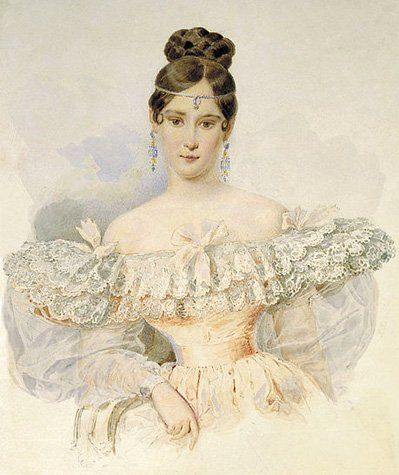
Gracefully, her narrow waist embraced in a tight corset, layers of skirts rustling behind her on the floor, Natalya Pushkina entered the room. Instead of her cousin, whom she believed was expecting her, she saw a longtime admirer: the elegant French émigré baron Georges d'Anthès, who also happened to be her brother-in-law. Throwing himself at Natalya's feet, d'Anthès passionately begged her to come with him; if not, he would put a bullet in his head. At that very moment, a child—the daughter of a relative—ran into the room, allowing Natalya a chance to escape the embarrassing scene.
Natalya Pushkina—better known by her maiden name, Goncharova—was pronounced by the tsar's court to be the most beautiful woman in Russia. She was famous for breaking hearts all around her, from lyceum students to the Russian emperor, who doted upon her. Her husband, the great poet Alexander Pushkin, called her "my Madonna."
Natalya's run-in with d'Anthès was to have tragic consequences. That same winter of 1837, d'Anthès challenged her husband to a duel, mortally wounding him. Pushkin died two days later, at the tender age of 37, at his St. Petersburg apartment on the banks of the River Moika.
Throughout their eight-year love affair, Natalya had not only been Pushkin's wife and mother of his four children, but also the poet's living muse. In the margins of his notebooks, Pushkin sketched dozens of studies of her: her dancer's feet, gracefully entwined in ballet ribbons; her proud silhouette, with its long neck and delicate facial features, framed with her crown of heavy curls. He sent besotted letters to his 113th love, as he jokingly called her (before meeting Natalya, he'd been quite the Don Juan), signing his missives, "I kiss the tips of your wings." Though he struggled with debts, jealousy and court intrigues, he was certain of one thing, at least: "Without you," he wrote Natalya, "I would have been unhappy all my life."
The poet was also fiercely protective of the beauty. "Poor wife, she suffers without any guilt, Society will torment her!" a wounded Pushkin once exclaimed in agony, imploring his friends to protect Natalya from evil gossips. After his death, his fears came to pass. Though friends were able to save Natalya from madness and devastation, she suffered bitter attacks on her character. For decades, critics blamed her for making Pushkin jealous with her coquettish, breezy nature; some even claimed she'd never loved him.
Indeed, in the annals of literary history, Natalya's legacy has been decidedly unflattering. Pushkin scholars called her a social-climbing beauty and a tease who flirted with d'Anthès. Russia's famous 20th-century poetesses Anna Akhmatova and Marina Tsvetayeva—both avid Pushkin fans—attacked Natalya as an "empty spot" in the poet's life and "a doll" who lived only for court balls and parties, and who wilted from boredom at home. Toward the end of her life, Akhmatova—caught up in the vortex of Stalinism—went so far as to call Natalya an "agent" and "accomplice" of Pushkin's enemies, and blamed her for not creating an appropriate cult around Pushkin's poetry after the artist's death. More recently, the modern novelist and poet Dmytry Bykov, a man who is popular as only a poet can be in Russia, has said he shares Akhmatova's regret that Pushkin's choice of a muse did not fall on one of his earlier, more worthy lovers.
It has taken two centuries for scholars to attempt a revival of Natalya's reputation. But just in time for the 200th anniversary of Natalya's birth, Pushkin expert Larisa Cherkashina debuted a new biography of the muse. Natalya Goncharova, which was published in Russia this fall and is the author's 11th book on Pushkin's life, makes the point that "worshipping Pushkin and blackening his Madonna are two wholly incompatible ideas." Basing her defense of Natalya on personal letters and documents—including some obscure gems that Cherkashina unearthed at state libraries and museums—the author insists that the young woman, whom Pushkin met as a 16-year-old girl at a Moscow ball and whom he loved until the last day of his life, deserves more attention. Though young, her intellect was sharp, and she was far more complex than just a simple femme fatale.
Among Cherkashina's discoveries are Natalya's own writings: notes, lyrics, and even large volumes of student books she penned in French, on the history and theory of Russian poetry. The scholar even found a short poem that Natalya wrote to her husband. The ditty is naïve and gentle, and she might have penned more, were it not for a letter back from Pushkin, who asked her to stop sending him poems. "I am tired," he told her, "of my own." It wasn't the only time Pushkin was harsh to his wife. In another letter from her husband—one of more than 60 Natalya preserved in her estate—he tells the queen of the St. Petersburg court balls, "What a fool you are, my angel." A different woman might have burned such an unpleasant missive, but Natalya saved it "with a pure, innocent and genuine heart," Cherkashina writes.
The biographer also breezily dismisses Natalya's harshest critics. Tsvetayeva and Akhmatova, she says, were—like many women in the 19th-century Russian court—merely jealous of Pushkin's intense ardor for his wife. The female poets—lesser beauties, to be sure—didn't like Natalya because they "simply wished they had lived next to the genius and inspired his poetry."

There's some evidence that Natalya's image is indeed starting to soften. Pushkin fans have taken to celebrating the beauty's birthday as Natalya Day, and this year, a grand ball was held for her 200th Jubilee at the Lopasnya-Zachatyevskoye palace, Natalya's home in the waning years of her life. (She was only 24 when Pushkin died and remained a widow for seven years, even though he'd instructed her to only mourn him for two.) The celebratory gala revived the air of Russia's court during Pushkin's and Natalya's day, when nobles flocked from all over Europe to dance in the emperor's ballrooms. The party's dress code hewed early 19th century (airy, off-the-shoulder dresses and officer uniforms) and noble manners abounded. Flirtation was encouraged. The quartet played a traditional French quadrille—the same music that would have floated across the Christmas Ball on Moscow's Tverskoy Boulevard so many centuries ago, when Pushkin first saw Natalya in a graceful white dress with a golden ring wreathing her shiny dark hair. At the present-day gala, Russia's intelligentsia proudly floated over the palace's parquet floor.
Younger Russian writers seem to be on board with the revival of Natalya's image. Zakhar Prilepin, a bestselling novelist, said the book was timely for young Russian women mesmerized by the "smart and beautiful" Natalya, who spent her youth consumed with an obsession for fashion and romance without feeling shallow for it.
As Russia's new post-Soviet elite start to revisit their history—the number of readers of Russian history books has almost doubled in the last few years—there will surely be more character revivals like Cherkashina's project. In the meantime, some Russian beauties are finding a kindred spirit in Natalya. "Today, we also face intrigues and traps, which are no less intense than in Goncharova's times," says Miroslava Duma, a fashion "it" girl who belongs to a group of socialites calling themselves the New Tsarinas. These girls are modern-day Natalyas, in a way—they attend the world's top fashion shows, sparkle in spectacular outfits, and take pride in traveling independently of their rich and famous husbands and fathers. There's just one difference between Natalya's day and their own, Duma says. "Innocence and modest are not popular [anymore]. Today's top beauties just grab men they find useful."
Uncommon Knowledge
Newsweek is committed to challenging conventional wisdom and finding connections in the search for common ground.
Newsweek is committed to challenging conventional wisdom and finding connections in the search for common ground.
About the writer
To read how Newsweek uses AI as a newsroom tool, Click here.






